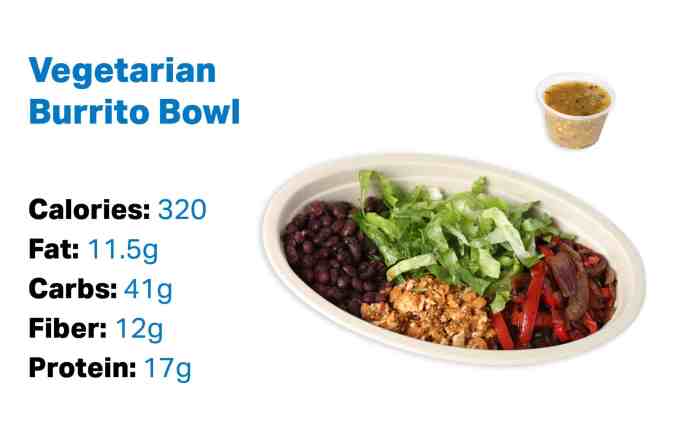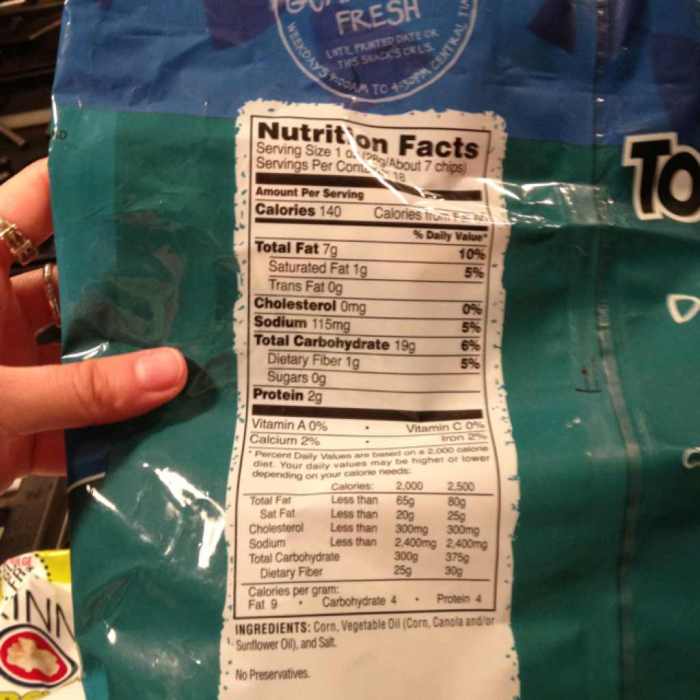Ingredient Breakdown and Allergens

Chipotle tortilla nutrition facts – Embarking on a journey of mindful consumption requires understanding the very essence of our food—its ingredients. Chipotle’s tortillas, the foundation upon which many a delicious meal is built, are no exception. A deep dive into their composition reveals not only the flavors but also the potential for allergic reactions, urging us to approach our nourishment with awareness and respect for our bodies.
Understanding the ingredients allows us to make conscious choices aligned with our individual needs and sensitivities. This knowledge empowers us to cultivate a harmonious relationship with our food, fostering a sense of well-being that extends beyond mere sustenance.
Flour Tortilla Ingredients
The humble flour tortilla, a canvas for countless culinary creations, is composed of a relatively simple yet significant blend of ingredients. Each element contributes to its texture, flavor, and overall character. Awareness of these components allows for informed choices, especially for those with dietary restrictions or allergies.
A typical Chipotle flour tortilla contains enriched bleached flour (wheat flour, malted barley flour, niacin, iron, thiamin mononitrate, riboflavin, folic acid), water, partially hydrogenated soybean oil, and salt. Gluten, a protein found in wheat, is a significant allergen present in this tortilla. Soy is another potential allergen to consider.
Corn Tortilla Ingredients, Chipotle tortilla nutrition facts
Chipotle’s corn tortillas, a testament to the ancient culinary traditions of the Americas, offer a gluten-free alternative. However, cross-contamination during processing remains a possibility, so vigilance is crucial for those with severe gluten sensitivities.
These tortillas typically consist of corn flour (nixtamalized corn), water, and lime. While naturally gluten-free, potential cross-contamination during processing should be considered. It is important to verify the manufacturing process and look for certifications that guarantee the absence of gluten for those with severe allergies.
Visual Representation of Flour Tortilla Ingredients
Imagine a circle representing a standard flour tortilla. The largest segment, approximately 60%, would depict enriched bleached flour, reflecting its dominant role in the tortilla’s structure. A smaller segment, around 25%, represents water, essential for binding the ingredients and creating the pliable texture. Partially hydrogenated soybean oil would occupy a small slice, about 10%, contributing to the tortilla’s softness and preventing it from drying out.
Finally, a tiny sliver, around 5%, signifies the salt, enhancing the overall flavor profile.
Sourcing and Processing of Key Ingredients
Chipotle’s commitment to sourcing and processing its ingredients is a vital aspect of its brand identity. The company emphasizes using high-quality ingredients whenever possible. While specific details about the sourcing of every ingredient may not be publicly available, their dedication to responsible sourcing practices is often highlighted in their marketing materials. The processing methods aim to maintain the integrity of the ingredients while ensuring food safety.
Information regarding specific suppliers and processing techniques is usually considered proprietary information.
Nutritional Impact and Dietary Considerations: Chipotle Tortilla Nutrition Facts

The humble tortilla, a cornerstone of many cuisines, holds a surprisingly significant place in the tapestry of balanced nutrition. Its impact extends beyond simple sustenance, touching upon aspects of dietary balance, mindful choices, and the mindful integration of food into our lives. Understanding its nutritional profile allows us to harness its potential for well-being.The tortilla’s nutritional contribution primarily stems from its carbohydrate content.
These carbohydrates provide the body with its primary source of energy, fueling our daily activities and sustaining our vital functions. However, the type of carbohydrate and the presence of fiber are crucial considerations. Whole-wheat tortillas, for instance, offer a richer source of fiber compared to their refined counterparts, promoting digestive health and contributing to feelings of satiety. This fiber acts as a gentle guide, slowing down the absorption of sugars into the bloodstream and preventing those sharp energy spikes and crashes.
This balanced release of energy is akin to a gentle stream nourishing the body, rather than a torrent overwhelming the system.
Tortilla Choices and Dietary Needs
The versatility of the tortilla extends to its adaptability to various dietary needs. Individuals following a low-carbohydrate diet may opt for tortillas made from alternative flours, such as almond flour or coconut flour, which significantly reduce the carbohydrate count while maintaining a satisfying texture. Those adhering to a gluten-free lifestyle can choose corn tortillas or tortillas made from gluten-free blends, ensuring that their dietary restrictions are met without sacrificing taste or enjoyment.
For vegetarians, the tortilla serves as a perfect canvas for an array of plant-based fillings, creating hearty and nutritious meals. The conscious choice of tortilla mirrors the conscious choice of aligning our diet with our body’s needs.
Incorporating Chipotle Tortillas into Healthy Meals
Chipotle tortillas, with their distinct flavor profile, can be readily integrated into a variety of healthy meals. Imagine a vibrant salad bowl, where a whole-wheat tortilla provides a satisfying base, topped with grilled vegetables, lean protein, and a light vinaigrette. Alternatively, a smaller tortilla can be used to wrap leftover grilled chicken or fish, creating a portable and nutritious lunch option.
Planning a healthy meal? Check out the chipotle tortilla nutrition facts before you start. Need a protein boost to balance your meal? Then check out the plain chobani nutrition facts to see how it fits your dietary needs. Knowing both the chipotle tortilla and Chobani nutrition facts helps you make informed choices for a balanced and delicious meal.
For breakfast, a whole-wheat tortilla can be transformed into a breakfast burrito, filled with scrambled eggs, black beans, and salsa. These are not just meals; they are opportunities to nourish the body and mind in harmony, a testament to the mindful approach to eating.
Comparison to Other Tortillas

The journey of nourishment transcends mere sustenance; it’s a path of mindful awareness, a communion with the earth’s bounty. Understanding the subtle differences in the nutritional composition of various tortillas allows us to deepen this connection, choosing ingredients that resonate with our bodies and spirits. This comparison illuminates the unique qualities of Chipotle tortillas within the broader landscape of tortilla options.The following exploration delves into the nutritional profiles of Chipotle tortillas, comparing them to both supermarket brands and the wholesome embrace of homemade tortillas.
By examining key similarities and differences, we can gain a clearer understanding of the choices before us, aligning our dietary practices with our inner wisdom.
Nutritional Content Comparison
A balanced approach to nutrition is akin to a harmonious symphony, where each element plays its part in creating a vibrant whole. This section presents a direct comparison of the macronutrient and micronutrient content across different tortilla types. Note that specific values can vary depending on the brand, size, and specific ingredients used.
- Chipotle Tortillas: Typically offer a balance of carbohydrates, moderate protein, and some healthy fats. They often contain whole grains, contributing to fiber content. The presence of added ingredients may vary.
- Supermarket Brand Tortillas (e.g., Flour Tortillas): Generally higher in carbohydrates, often refined, with lower fiber and protein content compared to Chipotle tortillas or whole-wheat options. They may contain added preservatives or unhealthy fats.
- Supermarket Brand Tortillas (e.g., Whole Wheat Tortillas): Higher in fiber and protein than standard flour tortillas. Nutrient content varies widely depending on the brand and specific ingredients used. Some may contain added sugars or preservatives.
- Homemade Tortillas (Corn or Flour): Allow for complete control over ingredients. Homemade corn tortillas, using nixtamalized corn, can be particularly rich in nutrients. Flour tortillas made with whole wheat flour offer superior nutritional value compared to those made with refined flour. The nutritional profile is highly dependent on the specific ingredients chosen.
Ingredient List Analysis
The ingredients list holds a mirror to the essence of a food, revealing its true nature. Understanding the components of each tortilla type allows us to make conscious choices, aligning our dietary journey with our values.
- Chipotle Tortillas: Ingredient lists typically include flour (wheat or corn), water, and possibly leavening agents. The presence of additional ingredients, such as preservatives or additives, varies by brand and should be carefully examined.
- Supermarket Brand Tortillas: Often contain refined flour, water, preservatives, and sometimes added sugars or fats. The ingredient lists can be lengthy and may include additives that are not ideal for optimal health.
- Homemade Tortillas: Offer complete transparency, as the ingredients are selected and controlled by the individual. This allows for the incorporation of whole grains, organic ingredients, and the exclusion of unwanted additives.
General Inquiries
Are Chipotle tortillas suitable for a gluten-free diet?
Only the corn tortillas are gluten-free. Flour tortillas contain wheat and are not suitable for those with gluten sensitivities.
How many calories are in a large flour tortilla?
The exact calorie count varies slightly depending on the batch, but it’s generally around 300-350 calories.
Are there any preservatives in Chipotle tortillas?
Chipotle’s ingredient list varies slightly depending on location and availability. Check the packaging for the most current information on preservatives. Generally, they aim for minimal processing.
Can I reheat Chipotle tortillas?
Yes, you can reheat them in a dry skillet or microwave for a few seconds to soften them. Avoid over-heating, which can make them dry and brittle.
